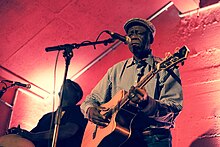Boubacar Traoré
Boubacar Traoré ('Kar Kar') (* 1942 in Mali ) is an African musician.
biography
Boubacar Traoré (also Kar Kar), born in Kayes in northwest Mali in 1942, started playing guitar in the late 1950s. He was influenced by Kassonké (a local variety), Afro-Cuban music and American blues . He was taught to play the guitar by his older brother, who was studying music in Cuba during the 1950s.
In 1960/61 Boubacar Traoré left Kayes and worked as a tailor in Bamako . He founded the "Pionniers Jazz".
He became famous in West Africa from 1963 with titles such as "Mali Twist", "Kar Kar Madison" and "Kayes Ba". He got his nickname Kar Kar as a footballer: 'karikari' is said when a player dribbles too much. He recorded a total of eight pieces for 'Radio Mali' - sung in French and Maninka. The similarity between the musical and dance style Twist, popular in the western world in the early 1960s, and the Twist, which Kar Kar sang only with guitar and percussion, is rather ideal, Traoré merely imitated it with his "ta-ra-ra "-Chorus. Boubacar Traoré (Kar Kar) is Elvis Presley , the Chuck Berry of Malis, he often appeared in a black leather jacket and was therefore called "Kar Kar, le blouson noir".
The "Mali Twist" was heard on the radio every morning and called on the population to help shape Mali , which has been independent since 1960 .
Boubacar Traoré married in 1967 and moved back to Kayes. In 1968 the Modibo Keita government was overthrown. Traoré, who was the most important musician during the years of the dawn of Mali, ended his career. In later interviews, Traoré complained that in the 1960s he never earned enough to make a living from music alone. For the next twenty years he worked in agriculture and as a freelance tailor. He only sang for friends.
In the late 1980s, Malian journalists came to Kayes for a TV report - they discovered Boubacar Traoré by chance and invited him to Bamako to film. Believed to have died, Traoré continued his career with cassette recordings after a break of twenty years.
In 1989, Traoré's wife died, he moved to France, where he worked as a construction worker and sang in front of migrants in the evenings.
In 1989, Traoré was found in France by British music producers who had heard his recordings from the late 1980s. Traoré began recording CDs for the international market in 1989 and touring all over the world.
In 2001/2002 the French film director Jacques Sarasin made the documentary "Je Chanterai Pour Toi" about Boubacar Traoré's life.
Discography
- 1990 Mariama, Stern's UK
- 1991 Kar Kar, Stern's UK
- 1995 Les enfants de Pierette, Revue Noire - out of print
- 1996 Sagolo, Label Bleu F
- 1999 Maciré, label Bleu F
- 2002 Je chanterai pour toi, Marabi F.
- 2005 Congo Magni, Marabi F
- 2011 Mali Denhou, Lusafrica
- 2015 Mbalimaou, Lusafrica
- 2017 Dounia Tabolo, Lusafrica
literature
- André Magnin: Malick Sidibé. Scalo, Zurich a. a. 1998, ISBN 3-908247-00-4
- Lieve Joris: Mali Blues. Piper, Munich 2000, ISBN 3-492-22977-8
Web links
- http://www.jechanteraipourtoi.com/
- http://mali-music.com/Cat/CatK/KarKar.htm
- Contemporary Africa Database ( Memento from September 27, 2007 in the Internet Archive )
- http://www.groovesound.ch/deutsch/agentur.php#k3
- https://www.youtube.com/watch?v=ix_qL0IXdKQ
| personal data | |
|---|---|
| SURNAME | Traoré, Boubacar |
| ALTERNATIVE NAMES | Kar Kar |
| BRIEF DESCRIPTION | Malian musician |
| DATE OF BIRTH | 1942 |
| PLACE OF BIRTH | Mali |
